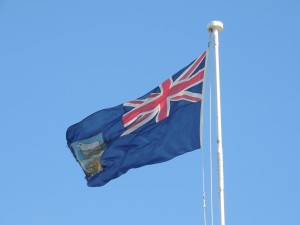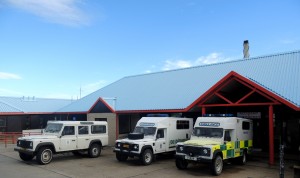When planning my elective I wanted to go somewhere that would really immerse me in rural health. During my research into various hospitals around the world I came across the Falkland Islands. I don’t think you can get much more rural than this place!
The Falkland Islands is a British Overseas Territory that most people will know about because of the Falklands Conflict in 1982 between Britain and Argentina. I won’t give you all a history lesson but if you ever venture this way it pays to have read up on the conflict as not a day has gone by since I’ve been here that it hasn’t come up in conversation.
The Falkland Islands is an archipelago of nearly 800 islands and is situated off the East Coast of South America. The total population is approximately 2,800 people of which 75% live in the township of Stanley. Mount Pleasant Airfield is the military base here in the Falklands and has over 2000 personnel at any one time.
With four Typhoon jet fighters, a handful of Hercules and bombers, a permanent frigate and nearly one soldier for every two civilians you could say it is a rather well defended country! After (incredibly luckily) being allowed to sit in the cockpit of a Typhoon myself I must say I feel quite safe here!During my stay here I am working mainly at the King Edward Memorial Hospital in Stanley. KEMH has 18 inpatient beds, seven elderly care beds, a one bed maternity suite and two ICU beds. There is one operating theatre, a radiology department with X-ray and ultrasound capabilities, a laboratory/pathology department and facilities for the other health disciplines such as physiotherapy, social work etc. So the hospital is small but relatively well-equipped to deal with most presentations.
The medical staff include five to seven general practitioners, one general surgeon and one anaesthetist. The GPs provide primary care, manage the medical inpatients and will be on call for the casualty department once a week. The surgeon and anaesthetist are on call 24/7 for all surgical emergencies, manage all surgical inpatients and will run an elective list once a week.I have been pleasantly surprised to find out that this number of doctors is perfectly adequate to keep up with demand. This is quite in contrast to nearly every other rural health sector I have come across where doctors tend to be in-demand, run off their feet and cannot keep up with the ever-mounting work load.
GP appointments can be booked on the day for acute issues or later in the week for non-urgent problems. Very different to many places where people have to wait for up to a month to get a routine GP appointment. The inpatient ward is hardly ever full and if you need an operation you’ll get it on the day or within a few weeks at most.
The Islands also have visiting specialists throughout the year who run clinics and operating lists. The same consultants usually come over each time and are available for consultation via telephone when they are back in the UK. This is a very similar system to the RuFUS scheme New Zealand’s West Coast DHB and Canterbury DHB have developed. Overall the health system is very efficient compared to most.
KEMH provides primary and secondary health care for all civilians and emergency care for military personnel, foreign fisherman and many tourists as well. I have spent most of my first week treating all of the above in the casualty department.During the commercial fishing season (which is now) ED will see numerous fisherman everyday with all sorts of ailments. They vary greatly in ethnicity; Thai, Malaysian, Singaporean, Chilean, Argentinian, Peruvian etc. Fortunately the shipping agents are all multi-lingual and by now have a very proficient medical vocabulary so can assist us with translation. The majority are musculoskeletal injuries usually repetitive strains, lacerations and fractures with the odd diarrhoea and vomiting bug thrown in for good measure.
Perhaps the most memorable patient I have met so far was a young 19 year old Indonesian male who got his arm caught in a steel cable. He had badly fractured his radius and ulnar and had partially amputated his ring finger at the PIP joint. He had sat on the boat for two days as they continued to fish, forced to wait until the boat was due to dock.
His finger was still attached by skin and flexor tendons with some capillary circulation however we didn’t think that it would survive for long. With only general surgery cover here in Stanley, these cases would be transferred to Chile for an orthopaedic surgeon to repair the fractures and carry out the amputation. This service is free to all Falkland Islanders but tourists and foreign nationals must be covered by insurance or pay for it themselves.
The first drama came when the fishing company’s insurance refused to pay for the transfer due to the high cost. If he could not pay for this then he would be repatriated back to his own country for treatment. Obviously he could not afford this. The likelihood of him getting adequate treatment back in Indonesia is also slim without medical insurance.
This boy really was in dire straits. He was sitting on our ward with a badly broken arm and a finger half cut off without any certainty that he would get either fixed. He was desperate not to lose his finger. That finger was basically his livelihood. If it were to be amputated he would no longer be deemed fit to work on fishing boats. The money he earned through this work was sent back home to support his family. We were not only dealing with his but a whole Indonesian family’s welfare.
After numerous hesitant translated discussions we eventually were able to get through to him that if the finger wasn’t removed it would die anyway which would likely lead to infection and could put his life at risk. He eventually consented to the procedure resigned that his fishing days were over. This was when his luck did take a turn for the better.KEMH conveniently had a visiting Orthopaedic surgeon here for only one day who ever so kindly added him onto the end of his long and busy operating list. We were able to remove the finger and plate and screw his radius and ulnar. Needless to say the othopod was viewed as a knight in shining armour by all the hospital staff even if the patient likely didn’t understand just how lucky he was to have got the operation he needed.
Reflecting on this case I was appalled at the conditions these fishermen work in. Their welfare on the boat isn’t taken into consideration at all. I heard many horror stories from the hospital staff of men being dumped ashore in terrible states or even worse being left aboard to die. Anecdotally, it wasn’t unheard of for these people to be simply pushed overboard either.
 It makes you sick to hear of this blatant disregard for human rights, and makes you feel awfully fortunate to live in a country such as New Zealand. I only hope that this patient is able to return to his home and find a way to provide for his family. I honestly think he does not realise just how lucky he is or what could have become of him in other circumstances.
It makes you sick to hear of this blatant disregard for human rights, and makes you feel awfully fortunate to live in a country such as New Zealand. I only hope that this patient is able to return to his home and find a way to provide for his family. I honestly think he does not realise just how lucky he is or what could have become of him in other circumstances.
I guess this case also highlights the risks of living rurally. In a place as remote as this, tertiary care is a long way away. By the time paperwork is completed, the plane arrives here from Chile, the patient is loaded and returned to Chile most patients will wait a minimum of 12-14 hours. With only basic ICU facilities here a lot could go wrong in those 12 hours. And that 12 hours is if the admin goes smoothly, the weather stays clear and the patient is stable enough for transfer.
That is the risk these people take while living here. They may be some of the most well protected people in the world in terms of military defence but they are very vulnerable when it comes to a medical emergency.




No comments yet.
Leave a comment